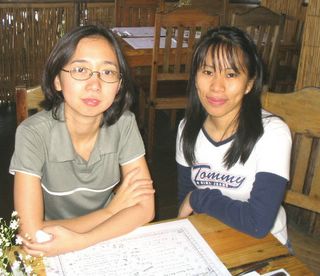Seven Days in Mindanao
General Santos, Koronadal City, Sultan Kudarat, T’Boli, Lake Sebu, Tacurong, Maguindanao—once just dots in the Philippine map for me—have now come to life. For seven days, I lived and breathed Mindanao.
As soon as I disembarked from the plane, the first thing I noticed was the weather—warmer than Manila’s. Even while I was taking a shower, I could almost feel sweat beads forming. The pace of living is slower this side of the world; there were not too many people in a hurry. The nearest mall to our homebase closes at 7:30 pm and the roads are virtually empty by 9. The silence of the place is calming, a stark contrast to the frenetic lifestyle in Manila—a welcome change for me.
But then again, it was not a vacation (though we had a day for rest and recreation at Lake Sebu) for me and thirteen other short-term and two full-time missionaries from Manila. For days, we became the hands and feet of Jesus to the T’boli tribes people and Muslims in South Cotabato. We would cram into a rented jeepney, endure the long and dusty travel on bumpy roads, and provide medical-dental and social care to our needy countrymen.
It was not easy, to say the least. But I’m not talking about the inconveniences we had to live with nor the service we had to do.
It was not easy for me to see our people in such a state of deprivation. I know that our country is poor but only recently realized how poor. While city dwellers like us complain of things like traffic or rising costs of commodities, our countrymen in far-flung areas contend—daily—with lack of food, treatable diseases which become fatal due to the unavailability of medical care. Lack of purpose. Lack of hope.
Majority of the population in the areas we visited is into farming. While dispensing medicine to an elderly Muslim woman, I asked her what her husband did for a living. Planting corn, she replied. Probing deeper, I learned that her farmer-husband sells a kilo of corn for seven pesos and that he only harvests once every three months. I dared not ask how much they earn every harvest time but I surmised that unless they sold more than six thousand kilos of corn, it won’t be enough to last them the three months up to the next harvest. Multiply this scenario hundreds, thousands of times, and you will get a portrait of poverty. And I haven’t started on their spiritual poverty yet.
Today I was back to my desk job. I was insulated from the heat and pollution in our air-conditioned office. The biggest struggle for me as soon as I sat down my chair was deciding what to do first, with the tons of work nagging for attention. Days from now, my Mindanao experience will probably fade into memory, until all I can recall are blurred images of faces, faint sounds of need. But may I not lose the grip of compassion. May I not lose faith in my God whose heart is big enough to accommodate each and every person. May I not lose sight of the fact that one day, someday, every tear will be wiped away by the nail-scarred hands of my Savior.


